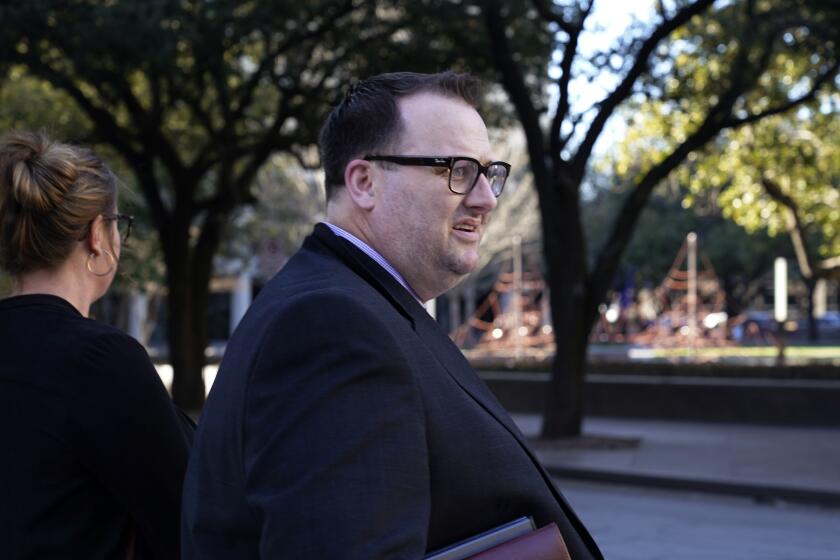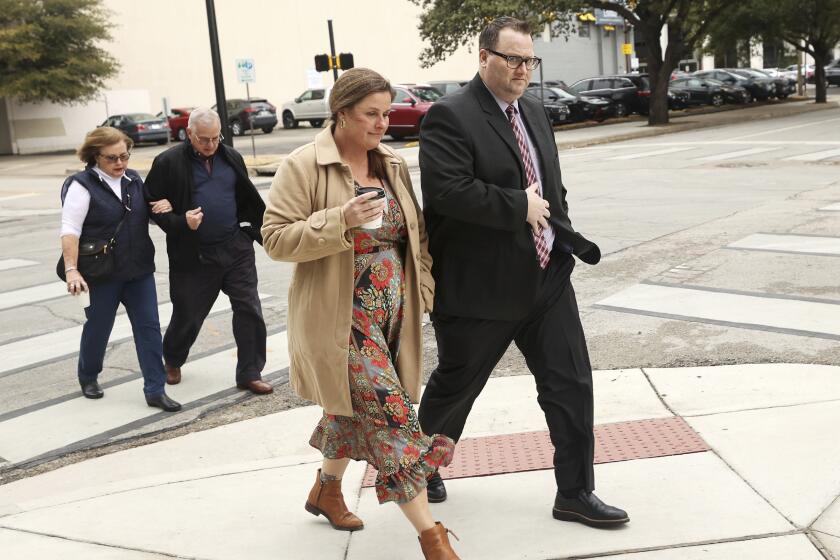Eric Kay’s appeal denied in fentanyl case that killed Angels pitcher Tyler Skaggs

- Share via
A federal court has rejected former Angels communications director Eric Kay’s appeal of his two felony convictions in the death of Tyler Skaggs in a terse, four-page ruling that affirmed Kay’s guilt for supplying the fentanyl-laced oxycodone that killed the Angels pitcher in 2019.
Kay was sentenced to 22 years in federal prison in October 2022. Skaggs died in his Southlake, Texas, hotel room on July 1, 2019, after the 27-year-old took the drugs supplied to him by Kay. The Angels were to begin a series against the Texas Rangers the next day.
Kay’s appeal contended that the evidence at trial was insufficient to sustain either conviction or to show that the proper venue for trial was Texas. Kay also challenged the propriety of statements made by the prosecutor during her closing arguments.
The U.S. Court of Appeals for the Fifth Circuit affirmed the convictions Wednesday, writing in the ruling that the evidence would allow a reasonable jury to conclude that Kay met with his supplier in California and obtained the pills after Skaggs asked him to do so, that Kay gave the pills to Skaggs in Texas, and that Skaggs died after ingesting one of the tainted pills. Two doctors testified at Kay’s trial that the fentanyl was the cause of Skaggs’ death.
Eric Kay, the Angels’ former communications director, has pleaded not guilty to federal charges in Tyler Skaggs’ death.
The court also rejected Kay’s assertion that the prosecutor made improper remarks during closing arguments by misstating evidence, vouching for the credibility of government witnesses and personally attacking the defense
counsel.
“The prosecutor did not personally attack defense counsel,” the court stated. “The challenged remark instead focused the jury on the weaknesses in the defense’s case and emphasized Kay’s inability to refute or undermine the inculpatory evidence.
“Finally, even if a remark could be construed as the prosecutor’s vouching for the credibility of the baseball players who testified that Kay sold them oxycodone, Kay does not deny that he did in fact distribute drugs to those players.”
Former Angels players Matt Harvey, C.J. Cron, Mike Morin and Cameron Bedrosian testified at trial that Kay distributed 30-milligram oxycodone pills nicknamed “blue boys” to them at Angel Stadium.
A Texas jury finds former Angels employee Eric Kay guilty on the charge of giving pitcher Tyler Skaggs the drugs that led to his fatal overdose.
At Kay’s sentencing hearing a year ago, U.S. District Judge Terry R. Means said he had been “dreading this day” because he felt the mandatory minimum of 20 years Kay faced was excessive. But the judge added two years to the total because of disparaging phone calls and emails by Kay that authorities intercepted after his conviction in February 2022.
Kay insulted Skaggs during a recorded jailhouse call, telling his mother, “I hope people realize what a piece of sh— he is. Well, he’s dead, so f— ‘em.” He suggested that his mother plant negative stories about the Skaggs family in the media and called the family “white trash.”
“All they see are dollar signs,” he said of the Skaggs family. “They may get more money with him dead than he was playing because he sucked.”
Kay also demeaned the jurors that convicted him, calling them “fat, sloppy, toothless and unemployed.”
Eric Kay was convicted of distributing fentanyl and giving Skaggs the drugs that caused his fatal overdose in 2019.
Kay, 49, is serving his sentence at the Federal Correctional Institution in Englewood, Colo. He is scheduled for release in 2041.
Skaggs’ widow and parents have filed a wrongful-death lawsuit against the Angels, claiming the team knew or should have known enough about Skaggs’ drug use to prevent his death. A trial originally scheduled to begin in October has been postponed because of pretrial motions pertaining to evidence.
More to Read
Go beyond the scoreboard
Get the latest on L.A.'s teams in the daily Sports Report newsletter.
You may occasionally receive promotional content from the Los Angeles Times.














